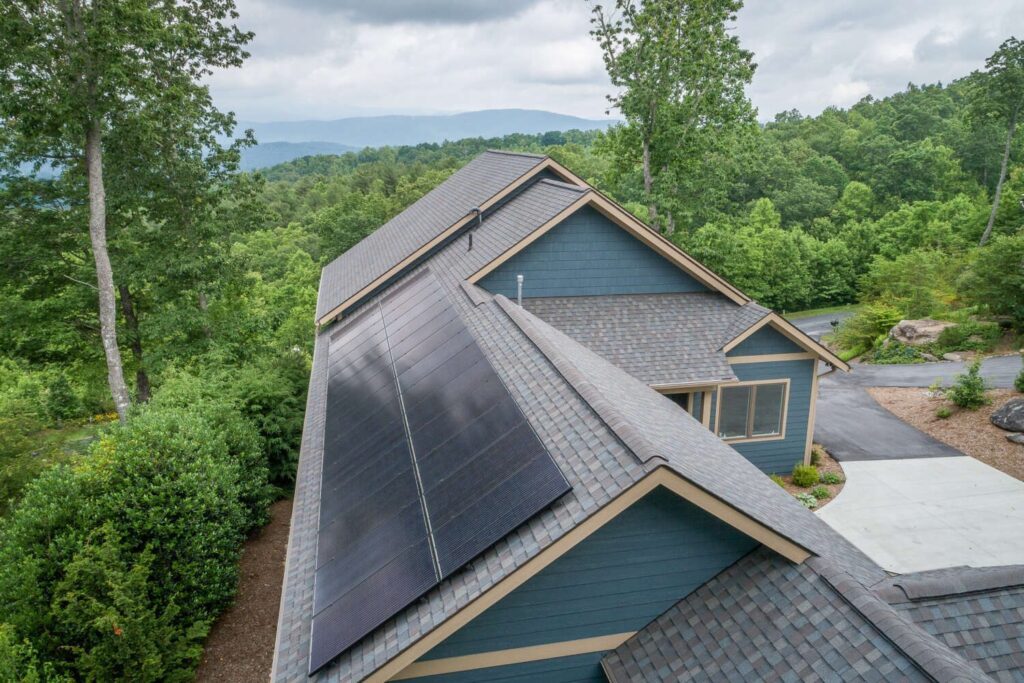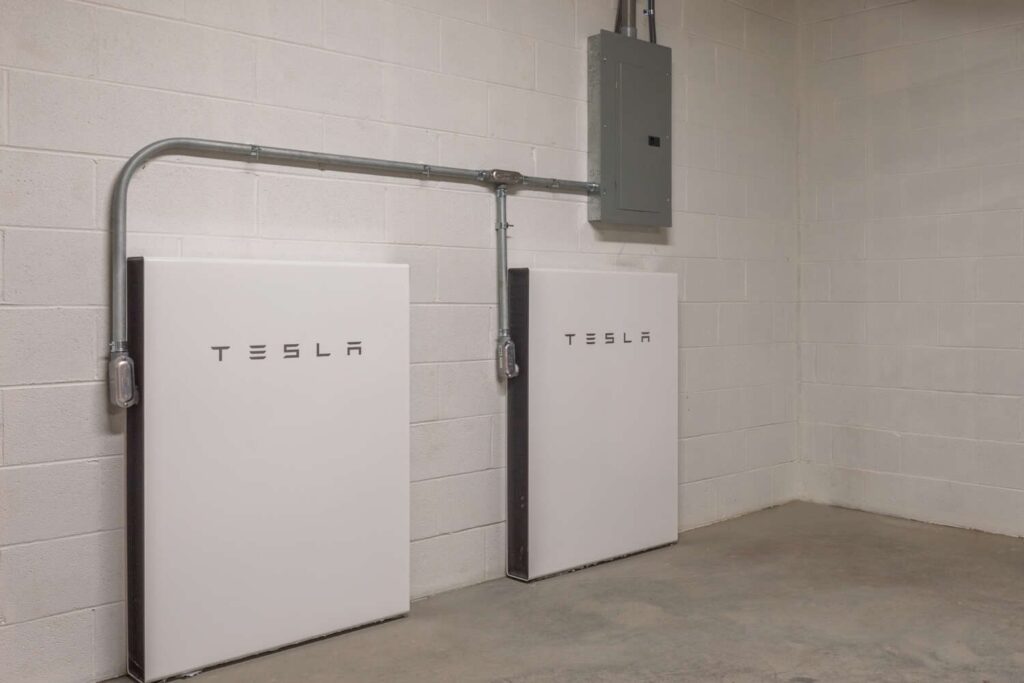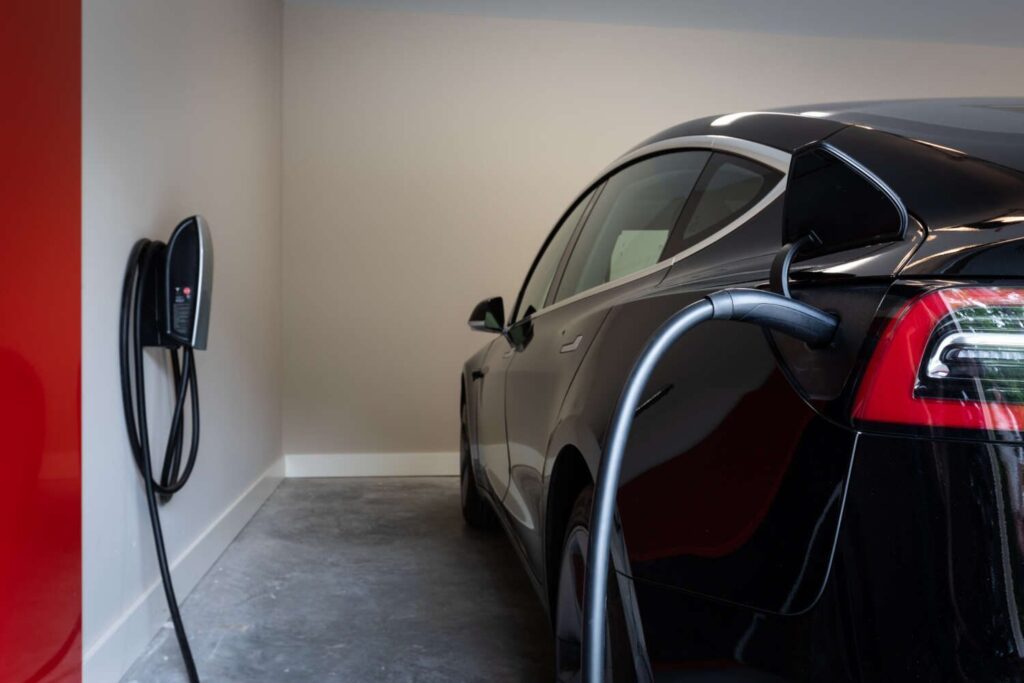Mike Herrick loves Western North Carolina for the area’s temperate year-round climate, and his wife Ellen wanted to live closer to their grandchildren on the east coast. But their shared goal when building their new custom house was to find the sweet spot between creating a comfortable home while being mindful and respectful of the resources they consume to provide that lifestyle.
So when the couple began designing their dream home in Hendersonville, they saw an opportunity to invest in renewable energy as a way to infuse their environmental values into their everyday lives. The Herricks both work from home for a software development company, which is another reason they prioritized energy reliability and efficiency.

Sugar Hollow Solar installed a 8.4-kW rooftop solar photovoltaic system with two Tesla Powerwalls integrated for battery backup. The Herricks’ solar-panel system works through net metering, a billing system that allows owners to receive credits on their monthly utility bills that are equal to the power they produce.
“We had the unfortunate experience of being without power for two weeks after Hurricane Sandy, which was especially painful since we had well water, so we knew that we wanted some sort of backup electric source and thought that a Tesla Powerwall would be much nicer than a conventional gas generator,” Mike said.
Sunshine powers their solar system, which earns the Herricks credits to use at night or on cloudy days. Additionally, their two Tesla Powerwalls provide backup electricity for when the grid goes down, as well as decrease the Herricks’ dependence on the utility grid by storing a power supply to pull from when sunshine isn’t directly available.
“Solar gives us the peace of mind that we’re doing our part,” Mike said. “We wanted to take advantage of solar electricity as much as possible, so everything except our hot water heater is electric. At the suggestion of Sugar Hollow, we installed a geothermal heat pump to further reduce our environmental impact.”

Installing a solar-panel system in their new home helped the Herricks build a life in line with their values, and has also translated into lower energy bills. Since the home is new, there were no pre-solar bills to compare against, but they report paying about $200 total for electricity usage in the last 12 months. On six of their recent bills, they have only owed the $15 connection fee to their utility.
“We were able to take advantage of federal tax credits for the solar installation as well as an incentive from Duke Energy, which Sugar Hollow was instrumental in procuring,” Mike said. “Later, when we installed a battery, we were also able to get a federal tax credit to offset some of the cost. In our particular case, we felt confident that this was the right way to go for the long term so the incentives were secondary but it does certainly speed up the payback period.”
Interestingly, the single largest consumer of the solar power their home produces is their electric car — a Tesla Model 3 that they charge through a Tesla wall charger in their garage — so this also represents money that they’d otherwise be paying at the pump.

The Herricks are also now able to set their thermostat to a comfortable temperature, where previously they’d tried to save energy by keeping it set on the brink of discomfort.
Ultimately, the couple said they enjoy being “solar pioneers” in their area and they often welcome curious neighbors who want to see how solar works.
“Solar just makes sense,” Mike said. “Why mine fossil fuels thousands of miles away, transport them to factories where carbon is released, then transport the electricity to your house, when sunshine is delivered most days directly to your house for free?”
Project Team breakout box
Builder — Kilpatrick and Company
Solar Installer — Sugar Hollow Solar
The System breakout box
Type: Net-metered solar photovoltaics with battery backup
Panels: 28 Mission solar panel
Inverter: Solar Edge
Battery Backup: Two Tesla Powerwalls
Installed: February 2019
Douglas Ager is a lifelong resident of Buncombe County, growing up at Hickory Nut Gap Farm and graduating from both Warren Wilson College and Western Carolina University. After spending years working with his hands as a farrier and carpenter, he co-founded Sugar Hollow Solar in 2012 with a mission to improve how business is done while seeking local solutions to the climate crisis. Connect with Douglas at sugarhollowsolar.com.
You can also view this article as it was originally published on pages 32-33 of the 2020-2021 edition of the directory.

